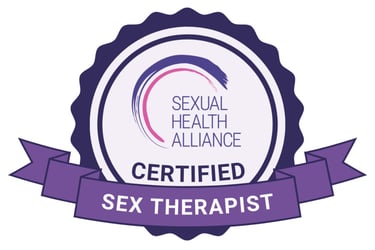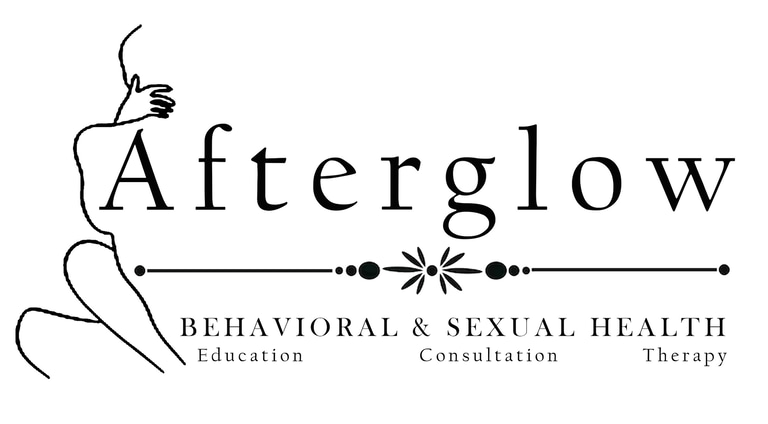From Battlefields to Bedrooms: A Veterans Day Salute to the Comeback of Pleasure
In honor of Veterans Day, this blog offers a candid, compassionate, and often humorous look at how military and first responder service impacts sexual health—and how healing is possible. Written from the perspective of a 30-year disabled veteran and clinician, it sheds light on the often-overlooked realities behind sexual dysfunction, from trauma and chronic pain to hormonal shifts caused by chemical exposure and medication. With data, empathy, and a touch of grit, it reminds men and women who’ve served that desire isn’t lost—it’s just waiting to be retrained. Through therapy, communication, medical care, and a healthy dose of humor, veterans and first responders can reignite passion, rebuild connection, and rediscover pleasure. Because, as Afterglow reminds us, every body deserves to feel good in their own skin.
PHYSICAL HEALTH AND SEXSEX AND MENTAL HEALTHGENERAL SEXUAL HEALTH
Dr. R. Kent
11/11/20254 min read


Every Veterans Day, we pause to honor the courage of those who serve—military personnel, first responders, firefighters, police officers, medics, and all who have faced danger so others could live safely. But this year, I’d like to offer a different kind of salute—one that’s both personal and professional:
“Thank you for your service—and let’s make sure you’re getting the pleasure and connection you deserve.”
As a 30-year disabled veteran, I understand this topic from both sides of the uniform. I’ve lived the reality of chronic pain, the weight of injury, and the long, complicated process of learning how to feel at home in your own body again. I also know, as a clinician, that sexual health is not a luxury—it’s a vital part of recovery, resilience, and human connection.
The truth is, sexual dysfunction among veterans and first responders isn’t just about trauma. It’s about what happens when the body that once ran toward chaos comes home to calm—and doesn’t quite know what to do with it.
Beyond the Battlefield: The Hidden Causes of Sexual Dysfunction
Most people assume post-traumatic stress is the main culprit behind sexual struggles in the veteran and responder community. And while trauma certainly plays a part, it’s far from the whole story.
A 2020 review in The Journal of Sexual Medicine found that veterans are nearly twice as likely to experience sexual dysfunction as civilians. The reasons aren’t just psychological—they’re systemic, chemical, hormonal, and physical.
Chronic pain and injury: Service wears the body down. Years of gear, heavy loads, and high-stress environments lead to back injuries, joint damage, nerve pain, and reduced stamina. When every move hurts, passion becomes something you have to plan around instead of lean into.
Amputation and body image: For many men and women, visible injuries and prosthetics reshape the way we see ourselves. But body image doesn’t have to determine intimacy. Couples who talk openly about changes often report deeper emotional and physical connection than they had before injury.
Chemical and toxin exposure: From burn pits overseas to industrial fires at home, countless veterans and first responders were exposed to chemicals that alter hormonal function. Research links these exposures to decreased testosterone, estrogen imbalance, and sexual dysfunction across genders. This isn’t in your head—it’s in your endocrine system.
Chronic illness and medication: Pain meds, antidepressants, and blood pressure drugs—many prescribed for service-related conditions—can dampen libido or delay arousal. Add hormonal shifts from aging, menopause, or low-T, and the system starts running on fumes.
So yes, trauma matters. But so do the things that happen to the body during and after years of service—the parts that no one warned us about when we signed up.
Humor: The Best Tactical Tool in the Bedroom
Now, let’s be honest—talking about sex after service can feel like trying to defuse a live grenade. But humor has always been one of our most powerful survival tools. When a retired soldier jokes, “My hydraulics need more maintenance these days,” or a medic says, “My pulse still races, just not for the same reason,” they’re doing what veterans do best—using laughter to take the sting out of struggle.
And science backs it up. A 2019 Frontiers in Psychology study found that shared humor strengthens intimacy and sexual satisfaction, especially in relationships facing pain, trauma, or disability. Laughter lowers stress hormones, releases endorphins, and reminds the body it’s safe to feel again. So yes—if you can still laugh, you can still connect. Humor isn’t denial—it’s defiance. It’s saying, “You can take my mobility, but you can’t take my mojo.”
PTSD, the Nervous System, and the Battle for Pleasure
For those living with trauma, pleasure often feels out of reach—not because of lack of desire, but because the body’s alarm system is still active. The nervous system can’t tell the difference between adrenaline from a firefight and arousal from touch. Both activate the same circuits.
Pleasure requires the opposite state—safety, rest, and trust. That’s why trauma-informed therapies like EMDR, somatic experiencing, and mindfulness-based sex therapy are crucial. They retrain the body to shift from fight-flight to rest-reconnect. Over time, people begin to rediscover sensation—not as danger, but as joy.
It’s not about going back to who you were before. It’s about learning how to live and love with who you are now.
Rebuilding Sexual Health: Hope, Healing, and the Comeback
Here’s the good news: for most veterans and responders, sexual function and satisfaction can be rebuilt. The process is part science, part patience, and part courage—the same kind of courage it takes to walk into danger in the first place.
1. Hormonal Repair and Medical Review
Exposure, stress, and age shift hormones for all genders. Hormone testing, medication adjustments, and targeted treatment can rebalance energy, mood, and desire.
2. Pain Management that Protects Passion
Physical therapy, adaptive positions, and pain-reduction techniques can make intimacy accessible again. The goal isn’t acrobatics—it’s closeness without discomfort.
3. Mind-Body Reconnection
Mindfulness, breathwork, and somatic techniques help retrain the nervous system to associate touch with safety, not threat. Over time, that shift restores arousal and confidence.
4. Partner Communication: Operation Connection
Open, judgment-free conversation turns isolation into teamwork. Whether through couples therapy or private dialogue, honesty becomes the most powerful aphrodisiac of all.
5. Community and Peer Support
Veteran and first responder wellness programs—like the VA’s Whole Health Initiative—now include sexual health as part of total recovery. Because connection is medicine too.
The Shared Mission: Serving the Self
Service teaches selflessness. But healing requires the opposite—learning to honor your own needs without guilt. Men and women who’ve served often struggle to ask for help or admit that intimacy feels foreign. Yet asking for support isn’t weakness—it’s leadership. It’s saying, “I’ve carried enough weight. Now I’m ready to heal.”
The same drive that fueled your mission can fuel your recovery. You already know discipline, teamwork, and perseverance—everything it takes to rebuild a body, a bond, and a sense of pleasure that belongs entirely to you.
A Veterans Day Promise
This Veterans Day, as we honor the flag and remember those we’ve lost, let’s also celebrate the living—the bodies that carry scars, the hearts that still long to connect, and the hope that never truly dies. You’ve fought enough battles. This next one isn’t about survival—it’s about revival.
Reclaim your right to feel. To laugh. To love. To live fully again. Because the war may have changed you—but it didn’t take away your humanity, your worth, or your capacity for pleasure.
Afterglow Behavioral and Sexual Health
Because every body deserves to feel good in their own skin.
Connect with us
© 2025. All rights reserved.
dr.kent.sexhealth@gmail.com


